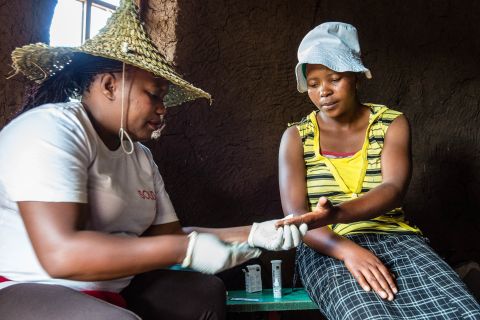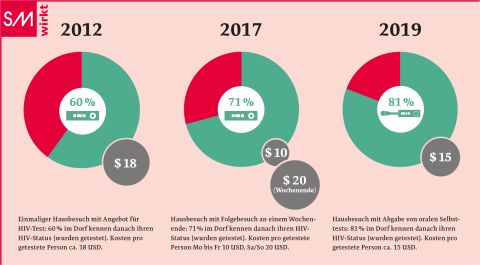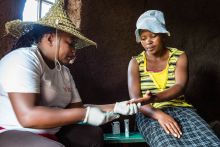Basic
How can we ensure that the population in remote areas of Lesotho is tested for HIV as regularly as possible? This was the key question of the three studies conducted by SolidarMed together with the Swiss Tropical and Public Health Institute (Swiss TPH) and the Institute of Social and Preventive Medicine in Bern.
Content
Content Media

Content Text
Since 2011, SolidarMed has been working in Lesotho with institutions such as the University of Basel, the Swiss Tropical and Public Health Institute (Swiss TPH) and the Institute of Social and Preventive Medicine in Bern to promote research. It is crucial that the research projects directly benefit the local health system and research subjects and that they deal with issues that are relevant to the region. Another important element is that the studies open up career opportunities for employees on the ground. The research findings are not only shared within the country, but also internationally. The costs of the research are borne by research partners; SolidarMed doesn’t use any donation funds for this purpose. The years of research have given rise to over 60 publications. Around 20 students from Lesotho have earned a Master’s degree, and three are working on a doctoral thesis.
Content Text
How research makes a difference to people in Lesotho
Just under 20% of Lesotho’s adult population (aged 19-45) is living with HIV. For a long time, discussions were had about how regular HIV testing could be rolled out to as many people as possible. SolidarMed has conducted three major studies on the topic in collaboration with the University of Basel.
Address Items
Content Text
Over 700 new diagnoses
These studies not only influenced the way in which HIV testing campaigns are conducted in Lesotho, but also contributed to the development of testing strategies in other countries. In addition, through these studies alone, 30,000 people were tested for HIV, leading to over 700 new diagnoses and timely treatment for those affected. The studies show how SolidarMed combines direct project work (offering HIV tests in remote areas) with research.
Content Media

Content Text
It should be noted that household-based HIV testing campaigns are now no longer recommended as the majority of the population now knows their HIV status, in other words most people who are living with HIV are aware of it. However, the methods (self-testing, follow-up visit etc.) are still used, e.g. during campaigns in schools, in mines in Lesotho and South Africa, and in campaigns targeted at people with a high risk of contracting HIV.
